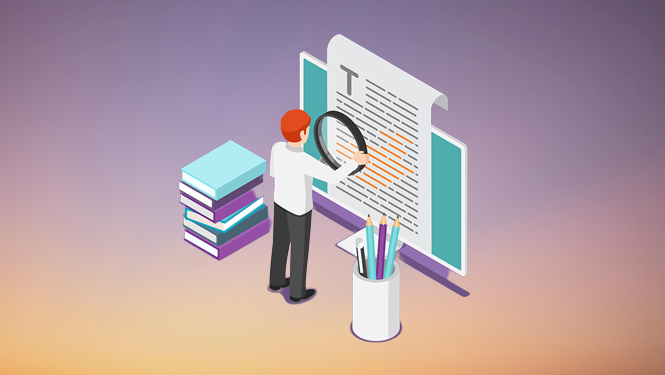Proofreading 101: How to Polish Your Writing Like a Pro
 ContentConcepts
ContentConceptsWhat is proofreading?

Proofreading is the process of carefully examining a written document to identify and correct errors in spelling, grammar, punctuation, syntax, and formatting. It involves reviewing the text line by line, word by word, and ensuring that it is free from any mistakes or inconsistencies.
The purpose of proofreading is to improve the overall quality and accuracy of the written work, making it clear, coherent, and error-free. It requires a keen eye for detail and a strong command of the language being used. Proofreading helps to enhance the readability and professional appearance of the document, ensuring that it effectively conveys the intended message to the reader.
How does proofreading help or benefit?
Proofreading your work is a crucial step in the writing process that offers several benefits. By thoroughly reviewing your work for errors, you can improve the clarity and readability of your writing, increase your credibility and professionalism, and effectively communicate your ideas to your readers. Moreover, proofreading can help you catch mistakes that may have gone unnoticed, such as spelling and grammar errors, punctuation mistakes, and incorrect word usage, which can significantly undermine the quality of your work.
Common Proofreading Mistakes to Avoid
To produce polished and error-free writing, it is crucial to identify and correct common proofreading mistakes. Here are some examples of common errors that can undermine the credibility of your writing:
Spelling mistakes
Misspelling words can lead to confusion and make your writing appear unprofessional. Always double-check your spelling using a spell-checker or dictionary.
Grammar errors
Incorrect grammar can make your writing difficult to understand and may even change the meaning of your sentences. Review your work carefully for issues such as subject-verb agreement, pronoun usage, and verb tense consistency.
Punctuation errors
Incorrect punctuation can change the tone and meaning of your writing. Make sure to use punctuation marks correctly, including commas, periods, and quotation marks.
Formatting errors
Incorrect formatting can make a piece of writing appear unprofessional and hard to read. Always double-check formatting elements such as font size, spacing, and margins.
Consistency errors
Inconsistent language, style, and formatting can be distracting to readers and undermine the credibility of a piece of writing. Make sure to maintain consistency throughout your work.
Fact-checking errors
Inaccurate information or incorrect citations can harm the credibility of a piece of writing. Always fact-check your work and ensure that all sources are properly cited.
Strategies for Identifying and Correcting Proofreading Mistakes
To effectively identify and correct proofreading mistakes, try using these simple yet effective strategies:
Take a Break Before Proofreading
It can be challenging to spot errors when you're too close to your writing. Take a break before proofreading to give yourself some distance from your work. This way, you'll have a fresh perspective and can more easily spot mistakes.
Use a Checklist
Create a checklist of common proofreading mistakes to avoid, and use it to review your work systematically. A checklist can help you stay organized and ensure that you don't miss any important errors.
Read Your Work Aloud
Reading your work aloud can help you identify errors and awkward phrasing that you may not notice when reading silently. This technique can also help you identify areas where your writing could be improved for clarity and flow.
Get Feedback
Ask for feedback from others, such as colleagues or friends, to help you identify areas for improvement. A fresh pair of eyes can often catch mistakes that you may have missed and provide valuable insights for improving your writing.
By using these strategies, you can become a more effective proofreader and improve the quality of your writing.
Best Proofreading Tools and Software
Proofreading tools and software are available online to help you identify and correct errors in your writing. Here are some of the popular options and their pros and cons:
1. Grammarly
Grammarly is an AI-powered online writing assistant that checks your writing for grammar, spelling, and punctuation errors. It offers a free version and a premium version with advanced features.
Pros:
- Easy to use
- Provides suggestions for improvement
- Integrates with Microsoft Word and Google Docs
Cons:
- Some features are only available in the premium version
- Can be expensive
2. Hemingway Editor
Hemingway Editor is an online tool that analyzes your writing for readability and clarity. It highlights long sentences, complex phrases, and passive voice to help you simplify your writing.
Pros:
- Easy to use
- Provides detailed feedback on your writing
- Offers suggestions for improvement
Cons:
- Does not check for grammar and spelling errors
- Cannot be used offline
3. ProWritingAid
ProWritingAid is an online writing assistant that checks for grammar, spelling, style, and readability issues. It offers a free version and a premium version with advanced features.
Pros:
- Comprehensive feedback on your writing
- Offers suggestions for improvement
- Can be used in multiple languages
Cons:
- Some features are only available in the premium version
- Can be expensive
Using these tools can help you to improve the quality of your writing and ensure that it is error-free and easy to read.

Professional Proofreading Services
Hiring a professional proofreading service can be beneficial in ensuring the accuracy and quality of your writing. Professional proofreaders can help you identify and correct errors in your work, as well as provide feedback on structure, style, and clarity. But how do you choose the right proofreading service? Consider the following factors:
References and Testimonials
Ask for references and testimonials from previous clients to assess the quality of their work. It is important to ensure that the editor has a proven track record of providing quality work and meeting deadlines.

Qualifications and Experience
Make sure the proofreader has relevant qualifications and experience in your field. This will ensure that they possess the technical knowledge and understanding of your subject matter to provide valuable feedback.
Editing Process
Ask the editor to explain their proofreading process and make sure it aligns with your needs and expectations. It is important to ensure that the editor's process is thorough and tailored to your specific needs.
Pricing and Services

Compare proofreading pricing and services from multiple editors to ensure you are getting a fair deal. While cost is an important factor, it should not be the only consideration. Look for a service that offers a range of services and can accommodate your specific needs.
When selecting a professional proofreading service, it is important to take the time to research and compare options to ensure that you get the best value for your money.
Strategies for Improving Proofreading Skills
Improving your proofreading skills takes practice and dedication, but there are several strategies that can help you become a more effective proofreader. These include:
Slow down
Take your time when proofreading to ensure that you catch all errors and inconsistencies. Rushing through your work can cause you to overlook mistakes that could affect the clarity and credibility of your writing.
Use a checklist
Create a checklist of common proofreading mistakes to avoid, and use it to review your work systematically. This can help you stay organized and focused while proofreading, and ensure that you don't miss any important errors.
Read your work aloud
Reading your work aloud can help you identify errors and awkward phrasing that you may not notice when reading silently. This technique can also help you improve the overall flow and readability of your writing.
Get feedback
Ask for feedback from others, such as colleagues or friends, to help you identify areas for improvement. Sometimes, it can be difficult to spot errors in your own writing, so having an outside perspective can be incredibly helpful. Additionally, receiving constructive criticism can help you grow as a writer and proofreader.
Subscribe to my newsletter
Read articles from ContentConcepts directly inside your inbox. Subscribe to the newsletter, and don't miss out.
Written by

ContentConcepts
ContentConcepts
Our English manuscript editors specialise in editing manuscripts written by authors whose first language is not English. Get the right word, right sentence structure and convey your research findings effectively.